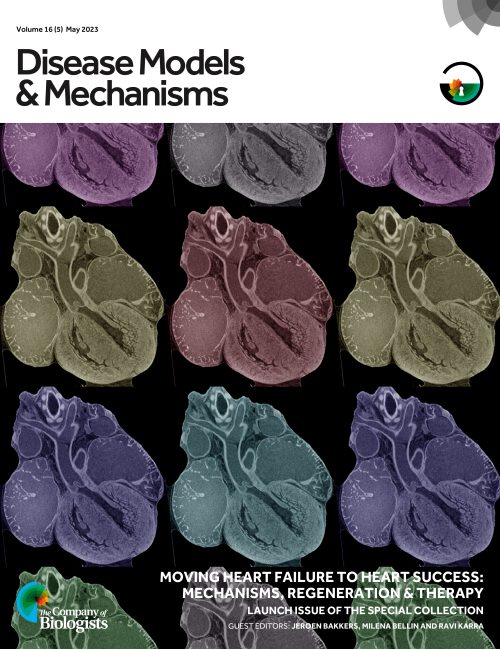Moving towards heart success – Disease Models & Mechanisms Special Issue
Posted by Kirsty Hooper, on 15 June 2023
Heart failure occurs when the heart is weakened or damaged, or when there is a problem with the heart’s valves or rhythm. Strikingly, it is the leading cause of hospitalisation and deaths in men and women worldwide. Nevertheless, significant gaps remain in our understanding of heart failure, and treatment, at best, results in disease remission. Our goal in shaping this Special Issue of Disease Models & Mechanisms (DMM) was to compile original Research, Resource and Review-type articles that investigate the genetic and biological mechanisms of heart failure and identify potential therapeutic strategies, as summarised in an Editorial from Guest Editors Jeroen, Milena Bellin and Ravi Karra.

A significant risk factor for heart failure is congenital heart defects, which are structural abnormalities affecting 8 out of every 1000 new-borns. The causes of congenital heart defects are diverse, which encourages the exploration of these disorders in the context of cardiac development. A Review from Christian Mosimann’s group summarises how defects in lateral plate mesoderm development drive congenital defects of multiple organs, including the heart, and a Research article from Didier Stainier and colleagues uses zebrafish to study the role of the epicardium, the outermost layer of the heart, in coordinating growth of the myocardium. Sally Dunwoodie and colleagues also published a study on a metabolic disease that results in congenital heart malformation.
Beyond disordered heart development, arrhythmias, which occur due to disruptions in the heart’s electrical system, represent another risk factor for heart failure. A Review by Vincent Christoffels and colleagues, published in this issue, explores the genetic causes of heart arrhythmias. Another Review from Eva Van Rooij’s group discusses the use of precise genome editing to generate models of and to potentially treat cardiomyopathies, which involve the remodelling of heart muscle and can also lead to heart failure if left untreated.
This special issue also provides an insight into the current understanding of acquired heart disease, with studies ranging from the investigation of strategies to mitigate cardiac remodelling upon injury to how the gut microbiome metabolite trimethylamine-N-oxide affects heart function.
Finally, the Special Issue includes ‘A Model for Life’ interview between leading experts Jeroen Bakkers and Didier Stainier, who discuss the advantages and disadvantages of zebrafish models of heart disease. Model organisms, both large and small, have been instrumental in advancing this field, with articles in this Special Issue using or discussing the use of mice, rats and pigs as valuable models of heart failure with strong translational potential. In addition, in vitro models, such as organoids, will provide new research opportunities to study cardiac development and related diseases, as summarised in the beautiful At a Glance poster article by Lika Drakhlis and Robert Zweigerdt and in ‘A Model for Life’ interview with Professor Christine Mummery. The Research, Resource and Review-type articles in this Special Issue cover a wealth of seemingly diverse topics. However, preventing, understanding and treating heart failure are the common threads that bind these articles. Follow the link below to read all the articles in this Special Issue for free.
https://journals.biologists.com/dmm/issue/16/5



 (No Ratings Yet)
(No Ratings Yet)